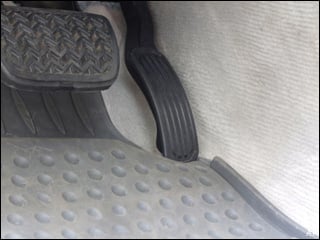Toyota Can't Get The Floormats Right
Before we jump into this one, it’s important to lay out a few caveats. The first is that, in general, TTAC doesn’t do recalls. It’s impossible to cover them with any fairness, and most of the time they’re inconsequential or hard to verify. The second is that TTAC really, really doesn’t do sudden unintended acceleration (SUA) scares. If someone tells you their throttle sticks wide open at precisely the same time as their brakes fail, they’re either covering for their own incompetence or looking for a buck. Period. Now, the proliferation of computer controls may have introduced a greater possibility of simultaneous system failures than existed on old, mechanically-actuated brakes and throttles. In fact, the recent rash of SUA complaints involving Toyota and Lexus models had me wondering if ghosts in the machine were rendering the time-tested SUA debunking test obsolete. No such luck. It turns out it’s the floormats, stupid. Toyota initially dismissed all SUA claims, but now Bloomberg reports they’re recalling floor mats on 3.8m Toyota and Lexus models for causing the gas pedal to stick.
Now, a well-informed, seasoned driver can tell when a mat is interfering with pedal operation. And he can certainly tell the difference between pedal interference and a computer going haywire. More importantly, once the problem has been identified he can either remove or modify the mat before it interferes at a potentially dangerous moment. The problem is that this level of competence appears to be shockingly rare in the United States, and Toyota really should have known it. Toyota should have understood that a piece of fabric sliding out of place would lead a healthy number of Americans to believe their car was possessed by demons. As my man Mencken put it, no one ever went broke under-estimating the intelligence of the American Public.
More by Edward Niedermeyer
Latest Car Reviews
Read moreLatest Product Reviews
Read moreRecent Comments
- El scotto UH, more parking and a building that was designed for CAT 5 cable at the new place?
- Ajla Maybe drag radials? 🤔
- FreedMike Apparently this car, which doesn't comply to U.S. regs, is in Nogales, Mexico. What could possibly go wrong with this transaction?
- El scotto Under NAFTA II or the USMCA basically the US and Canada do all the designing, planning, and high tech work and high skilled work. Mexico does all the medium-skilled work.Your favorite vehicle that has an Assembled in Mexico label may actually cross the border several times. High tech stuff is installed in the US, medium tech stuff gets done in Mexico, then the vehicle goes back across the border for more high tech stuff the back to Mexico for some nuts n bolts stuff.All of the vehicle manufacturers pass parts and vehicles between factories and countries. It's thought out, it's planned, it's coordinated and they all do it.Northern Mexico consists of a few big towns controlled by a few families. Those families already have deals with Texan and American companies that can truck their products back and forth over the border. The Chinese are the last to show up at the party. They're getting the worst land, the worst factories, and the worst employees. All the good stuff and people have been taken care of in the above paragraph.Lastly, the Chinese will have to make their parts in Mexico or the US or Canada. If not, they have to pay tariffs. High tariffs. It's all for one and one for all under the USMCA.Now evil El Scotto is thinking of the fusion of Chinese and Mexican cuisine and some darn good beer.
- FreedMike I care SO deeply!

































Comments
Join the conversation
Pch101- Yep I think brakes should always stop a car. But I'm wondering if anyone has ever tested this: Lexus driving already at 80mph California speed- guy tries to pass, floors pedal, pedal gets stuck. Very quickly, the overpowered car gets to 100, gas still floored. Breaking begins, driver gets the car to go back down to about 70 or 80 or so. Fading starts. After driver realizes he cannot figure out what is wrong and fix it, he tries more breaking. By now, breaks are faded and cannot hold against existing momentum+floored throttle. So perhaps, breaks cannot always stop car. I guess the question is, under full throttle, what percent of breaking power is used just to overcome the torque. If it is only like 5% then yeah, the breaks should always stop the car. But if it is more like 30% and they are already faded, I dunno..
Four lives have been lost, over what should have been a fun outing. All would agree that this tragedy occurred needlessly. Very little public good is served in making judgments about the character and steed of the driver behind the wheel. None of us were there. We do not, and will never, understand the abject fear of the occupants in that vehicle; and how that would have crowded judgment. My initial reactions and questions were the same as everybody else's: 1. Why didn't he put the car into neutral? 2. Why didn't he slam on the brake pedal and put his almighty weight on it till the car stopped? 3. What about the emergency brake? 4. Why didn't he shut off the engine? 5. How is it possible for a floor mat to jam the gas pedal into acceleration? Question #4 was quickly explained when I saw pictures of the set up. Questions #1. and #2. were rationalized on the basis of brain block in the face of panic and fear. And I started to wonder about #3 and #4. My Audi A4 has requires a push on the key to shut off the engine - when it is stationary - and has push button "handbrakes". Have I ever thought that there is any chance that I may need to shut off the engine and use the push button to actuate the handbrake when the car is skipping along at 70 mph? Well - no! And I still haven't tried either. Should I? Will they work? Will there be significant damage to the car? Would such abuse be covered by warranty? With the set up as in the picture, is it possible that when the mat slips all the way up the gas pedal, the following might result: 1. The mat is now also sitting under the brake pedal, therefore, impeding maximum braking. 2. The close proximity of the gas and brake pedals means that pushing on the brake pedal actually causes the mat to also push down on the gas pedal - thereby exacerbating the problem.